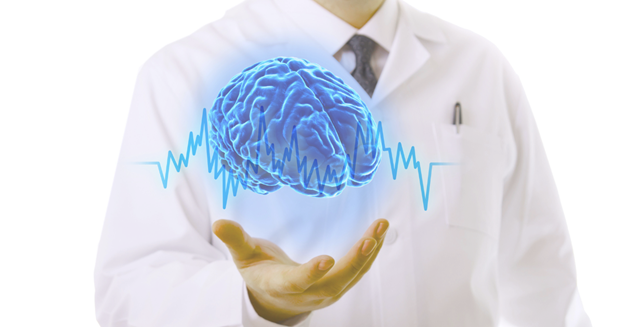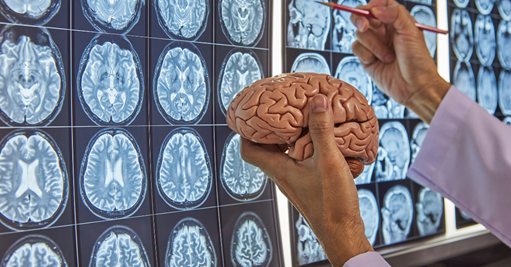AHW Health Grants Drive Breakthroughs in Neurosurgery Patient Care
September 2, 2025 Posted by AHW Endowment

Neurosurgical conditions affect thousands of Wisconsin residents each year, from traumatic brain and spinal cord injuries to degenerative spine diseases that primarily impact older adults. These complex neurological conditions can cause significant physical disabilities, cognitive impairments, and reduced quality of life for both patients and their families.
The Advancing a Healthier Wisconsin Endowment (AHW) recognizes the importance of advancing neurosurgical care and funds groundbreaking research projects aimed at improving outcomes for patients across the state. Through strategic investments in cutting-edge research, AHW is helping to develop new diagnostic tools, treatment approaches, and rehabilitation methods that will benefit Wisconsin's neurosurgical patients for years to come.
Neurosurgical Conditions Impact Wisconsin Communities
Neurosurgical conditions present significant challenges for Wisconsin's healthcare system and communities. Each year, the state experiences over 200 new spinal cord injuries, most commonly caused by motor vehicle crashes, falls, violence, and sports injuries.
The aging population faces a particularly increased risk of degenerative spine conditions. Wisconsin's population over the age of 65 is projected to increase from 780,000 residents in 2010 to over 1.5 million by 2040, resulting in a corresponding rise in age-related neurosurgical conditions. Many of these conditions require complex surgical interventions, yet outcomes from current treatments remain difficult to predict.
AHW-Funded Neurosurgery Research Projects Address Critical Healthcare Needs
AHW funding supports innovative neurosurgical research projects that tackle these pressing healthcare challenges. These efforts range from developing new imaging and diagnostic methods to creating innovative rehabilitation approaches that could transform patient treatment.
Establishing Models for Combined Brain and Spinal Cord Injuries
Many spinal cord injury patients also suffer from traumatic brain injuries, creating complex clinical challenges that medical professionals do not yet fully understand. Research led by the Medical College of Wisconsin's (MCW's) Antje Kroner-Milsch, MD, PhD (Neurosurgery), along with co-investigator Brian Stemper, PhD (Biomedical Engineering), is working to create accurate systems for studying combined brain and spinal cord injuries.
This research aims to validate clinical observations suggesting that combined injuries result in worse outcomes than individual brain or spinal cord injuries alone. The research team is investigating whether simultaneous injuries to both the brain and spinal cord impede recovery and cause more extensive damage to nerve cells and tissues. With $50,000 in AHW funding, this 12-month project will provide essential preliminary data for larger federal funding applications and could lead to the development of targeted treatment approaches for patients with these complex, dual injuries.
Developing Better Diagnostics for Chronic Back Pain
Chronic lower back pain affects millions of Americans and costs the healthcare system billions annually, yet current diagnostic methods have significant limitations in identifying the underlying causes. MCW's L. Tugan Muftuler, PhD (Neurosurgery), along with co-investigators Matthew Budde, PhD (Neurosurgery), and Brian Stemper, PhD (Biomedical Engineering), is investigating how degeneration of spinal disc surfaces contributes to chronic lower back pain.

This 30-month project, funded with $199,529 from AHW, focuses on developing accurate diagnostic techniques for vertebral endplate damage—deterioration that occurs when spinal discs break down and create uneven pressure on surrounding bone structures. The research addresses a critical gap in current medical practice, as no imaging techniques currently provide reliable insight into the underlying causes of non-specific lower back pain or accurately predict patient responses to treatment.
Advancing Diagnostic Tools for Degenerative Spine Conditions
Degenerative cervical myelopathy—a condition in which the spinal cord in the neck becomes compressed due to age-related spine changes—affects Wisconsin's aging population, yet current diagnostic tools provide limited guidance on which patients will benefit from surgery. MCW's Aditya Vedantam, MD (Neurosurgery), working with co-investigators Kevin Koch, PhD (Radiology), and Anjishnu Banerjee, PhD (Data Science Institute), is developing advanced methods to analyze MRI scans for better patient diagnosis and recovery prediction.
The project focuses on using computer analysis to extract detailed information from standard MRI images, revealing subtle changes in spinal cord tissue not visible through conventional examination. This $50,000, 12-month AHW-funded project aims to identify specific patterns in MRI scans that can predict surgical recovery outcomes, potentially reducing diagnostic delays that currently span one-to-five years for many patients. The research utilizes standard MRI equipment already available in hospitals without requiring additional scan time, facilitating straightforward implementation in clinical practice.
Understanding Brain Networks in Cancer Recovery
Wisconsin's above-average rates of brain and central nervous system cancers underscore the need for a better understanding of how these tumors affect motor function and recovery. MCW postdoctoral researcher Timothy Frederic Boerger, PhD, working with co-investigators Max Krucoff, MD (Neurosurgery), Brian D. Schmit, PhD (Marquette University Biomedical Engineering), and Jennifer Connelly, MD (Neurology), is mapping the relationships between brain anatomy and motor function in brain tumor patients.
The 18-month project, supported by $50,000 in AHW funding, aims to build evidence for a model that maps how brain injuries disrupt communication pathways and how the brain adapts to restore function. This research challenges traditional concepts of brain function by examining how interconnected brain networks, rather than isolated brain regions, contribute to motor recovery following tumor surgery. The findings could redefine understanding of neuromotor injury and establish new foundations for neurorehabilitation approaches specifically designed for Wisconsin's brain tumor patients.
Revolutionizing Hand Function Rehabilitation
For patients with degenerative cervical myelopathy who undergo surgery, impaired hand dexterity remains a significant challenge that affects daily activities and quality of life. MCW's Aditya Vedantam, MD (Neurosurgery), along with co-investigators Shekar Kurpad, MD, PhD (Neurosurgery), Brian D. Schmit, PhD (Marquette University), Derek Kamper, PhD (North Carolina State University), and Priyanka Shah-Basak, PhD (Neurology), is utilizing virtual reality technology to help patients regain hand function following surgery.
This innovative 30-month project, funded with $200,000 from AHW, combines virtual reality training exercises with brain activity monitoring to help researchers understand how changes in neural function relate to improved hand performance. The virtual reality training system could be adapted for home use by patients, potentially expanding access to specialized hand rehabilitation throughout Wisconsin and reducing long-term disability for patients with cervical spine conditions.
Advancing Neurosurgical Care for All Wisconsin Residents
These AHW-funded research projects represent a significant investment in Wisconsin's neurosurgical future. By supporting innovative research that spans from fundamental scientific discoveries to clinical applications, AHW is helping to develop the next generation of diagnostic tools, treatment approaches, and rehabilitation methods that will improve outcomes for patients with complex neurological conditions throughout the state.
Learn more about the variety of projects AHW has funded on our Funded Projects Page of our website.




